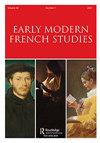简介:你想要吗?
IF 0.2
3区 历史学
Q2 HISTORY
引用次数: 0
摘要
Janequin作品的文本和表演提出了关于文学中社会阶层的表现和合唱环境中日常言语的表现的重要问题。它以一种看起来很现实的方式介绍了巴黎街头歌手的声音——醋、绿酱、芥末、鲱鱼——但也吸引了人们对他们的文学结构的关注,因为这首歌最终暴露了它自己的项目的不可能性:“Si vous en voulez plus ouyr, allez les donc querre !”在16世纪的语境中,这个笑话可能是针对那些精英观众的,他们会在宫廷里听到詹纳金的作品,却不会屈尊步行去见小桥上的小贩,詹纳金把他们的声音变成了复调。现代学者可能会有不同的感受。对于那些不仅对阅读过去感兴趣,而且对理解它的声音感兴趣的研究人员来说,Janequin的结论简洁地总结了这个问题,因为我们显然不能直接问他的街头歌手,只能通过现有的来源接近他们的声音。研究人员如何去理解过去的声音世界,尤其是近代早期法国的声音世界呢?我们准备这一特殊数字的主要激励因素之一是,在早期现代法国研究中,致力于日益活跃的声音研究学科的作品相对较少。虽然R. Murray Schafer的开创性工作,以及早期现代英国的Bruce R. Smith的开创性工作,可以追溯到上个世纪,但最近在前现代法国研究中对声音的广泛研究大多集中在19世纪或中世纪时期。一个数字本文章由计算机程序翻译,如有差异,请以英文原文为准。
Introduction: Voulez ouyr?
The text and performance of Janequin’s work raises important issues about the representations of social classes in literature and the performance of everyday speech in a choral context. It introduces the voices of Parisian street singers in ways that seem immediately realistic — vinegar, green sauce, mustard, herring — yet also draw attention to their literary construction as ultimately the song exposes the impossibility of its own project: ‘Si vous en voulez plus ouyr, allez les donc querre !’ In a sixteenth-century context, the joke is perhaps on the elite audiences who would hear Janequin’s pieces performed at court yet would not deign to expose themselves on foot to the hawkers on the Petit Pont whose voices Janequin transposed into polyphony. Modern scholars might feel the provocation differently. For those researchers interested not only in reading about the past, but in understanding how it sounded, Janequin’s conclusion summarizes the problem concisely, for we evidently cannot ask his street singers directly and can only approach their voices through the existing sources. Howmight researchers go about understanding past sound worlds, and the sound world of early modern France in particular? One of our main motivating factors in preparing this special number has been the relative absence of works within early modern French studies devoted to the increasingly buoyant discipline of sound studies. Although the pioneering work of R. Murray Schafer, and, for early modern England, that of Bruce R. Smith, date back to the last century, the majority of wider-ranging recent research on sound within pre-modern French studies has tended to focus upon the nineteenth century or the medieval period. A number
求助全文
通过发布文献求助,成功后即可免费获取论文全文。
去求助
来源期刊

Early Modern French Studies
Multiple-
CiteScore
0.10
自引率
0.00%
发文量
14
期刊介绍:
Early Modern French Studies (formerly Seventeenth-Century French Studies) publishes high-quality, peer-reviewed, original articles in English and French on a broad range of literary, cultural, methodological, and theoretical topics relating to the study of early modern France. The journal has expanded its historical scope and now covers work on the sixteenth, seventeenth, and eighteenth centuries. Within this period of French literary and cultural history, the journal particularly welcomes work that relates to the term ''early modern'', as well as work that interrogates it. It continues to publish special issues devoted to particular topics (such as the highly successful 2014 special issue on the cultural history of fans) as well as individual submissions.
 求助内容:
求助内容: 应助结果提醒方式:
应助结果提醒方式:


